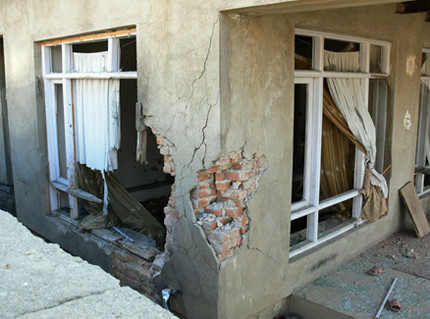It was almost midnight when a massive bang awakened residents of Kabul’s fifth district on 5 September. A rocket had landed on a house killing three members of the family: the father, mother and a child.

Mir Aziz, his wife and their daughter died when a rocket landed on their house in Kabul on 5 September (Photo: Roshan/IRIN)
In the past month at least 10 rockets have been fired on different parts of Kabul, often killing or wounding civilians, according to the Ministry of Interior (MoI).
In less than a month, well over a dozen civilians have also died in a number of suicide attacks in Kabul: on 8 September a suicide attack near the airport killed two civilians and wounded six; on 18 August a suicide attack killed 10 (including two UN national staff) and injured 50; and a suicide attack in front of the NATO premises in Kabul on 15 August killed nine and wounded 90, most of them civilians.
“Whoever is firing these rockets and organizing suicide attacks is only killing innocent civilians,” said a man whose house sustained damage because of a rocket attack on 5 September.
A woman who lost her husband in the 18 August suicide attack said her family was devastated by the loss. “My husband was only a taxi driver. Who will feed my children now; who will pay for their clothes; who will pay for their medicine; who will pay for their education?” she asked.
“Indeed, terrorist attacks have increased recently, which is worrying Kabul citizens because the enemy wants to exert psychological pressure on the people,” Zemarai Bashari, MoI’s spokesman, told IRIN.
Taliban insurgents have often claimed responsibility for the attacks through their purported spokesmen.
However, it is unclear where the insurgents get their weapons and how their fighters and suicide bombers penetrate the capital.
Home to an estimated four million people and thousands of international military and diplomatic personnel and aid workers, Kabul has seen an increasing number of security measures being put in place - from blast resistant walls to road blocks to heavily armed patrols and the deployment of private security contractors.
Organized crime
Some analysts are linking organized crime, corruption and illegal militia groups to the latest spate of attacks in the capital.
“The old subversive groups who were shelling Kabul and terrorizing civilians in the past have been reactivated,” said Noorullah Stanikzai, a lecturer at Kabul University.
“There are criminal elements that add fuel to the insurgency-related insecurity,” Wadeer Safi, a law professor and political analyst, told IRIN.
Armed criminal gangs are not only blamed for abductions, assassinations and extortion, but are believed to be smuggling arms, explosives and supplying intelligence to the insurgents, experts say.
“Some criminal activities such as drug smuggling and high-profile kidnappings have financial and political linkages with the insurgency,” said MoI’s Bashari.
History repeating itself?
“People are increasingly worried about their security not only in Kabul but throughout the country,” said Ahmad Zaki, a Kabul resident.
“If insecurity increases people will be forced to migrate abroad again,” said Stanikzai.
“No one wants to live in a city with constant fear of death in [the form of] a blind rocket or explosion,” said political analyst Safi.
Whilst Afghan and international officials categorically blame the insurgents for the violence, a BBC/ ABC/ ARD poll in February 2009 showed 27 percent of Afghans blame the Taliban for the violence in their country, while 12 percent blame US forces, and 12 percent blame the government.
“The current insecurity trend is dissimilar to the 1990s, but it has the potential to get worse and push the capital back to the old dark age,” said Safi.
“We’re doing our best to improve security: We have increased the police force in Kabul from 7,000 to over 11,000,” said Bashari.
Todd Vician, a spokesman for the NATO-led International Security Assistance Force (ISAF) in Kabul, told IRIN ISAF was concerned about the safety of Kabul citizens, and that it has been working hard to enhance the capability of the Afghan national security forces.



